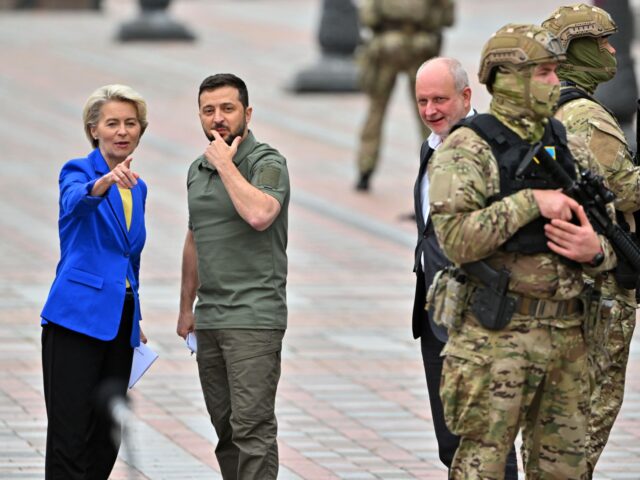Ursula von der Leyen, the German defence minister turned unelected leader of the European Commission, said the European Union will not be “complete” until Ukraine, Moldova, Georgia, and the Western Balkans are absorbed by it.
In the President of the European Commission’s so-called State of the Union address, designed to ape the State of the Union address in the United State of America — in reflection of European integrationists’ ambition that the EU will one day become the United States of Europe — the German technocrat insisted that the “path towards strong democracies and the path towards our Union are one and the same.”
“I want the people of the Western Balkans, of Ukraine, Moldova, and Georgia to know: You are part of our family, your future is in our Union, and our Union is not complete without you!” she declared.
In addition to seeming to confirm the warnings of British Brexiteers about the bloc’s expansionist mission, President von der Leyen’s open ambition to gather in additional Balkan and Eastern European states will likely serve to worsen the diplomatic strife between the bloc and the Russian Federation.
Serbia, in the Western Balkans, has long been a key partner of Russia, while Moldova and Georgia are both burdened with autonomous pro-Russian separatist states on their territory, in the form of Transnistria and South Ossetia, and Ukraine hosts two such ad hoc states and is actively at war with Moscow.
Speaking on the subject of the war in Ukraine directly, von der Leyen claimed that from the “very moment” of Russia’s full-scale invasion of Ukraine in late February, “a whole continent ha[d] risen in solidarity” — inaccurately, given Belarus supported the invasion and other European states, such as Serbia, have been at best ambivalent with respect to supporting Ukraine.
She also claimed that “Europeans neither hid nor hesitated” in the wake of the invasion and “found the courage to do the right thing” — far from the truth in the case of her native Germany, according to the Ukrainians, with Ambassador Andrij Melnyk saying senior German politicians had initially told him they would not bother reversing German policy on weapons shipments to Ukraine or seek to eject Russia from the SWIFT banking system because Kyiv (Kiev) would fall in a matter of “hours” regardless.
“It was the worst conversation in my life,” the Ukrainian ambassador recalled.
In a rare moment of self-reflection, President von der Leyen did concede that the EU’s leading powers “should have listened to the voices inside our Union – in Poland, in the Baltics, and all across Central and Eastern Europe” who urged them to reduce their dependence on Russian energy.
Former U.S. President Donald Trump, who told the Germans, in particular, the same thing at the United Nations and was laughed at by their delegation for his trouble, did not receive any acknowledgement, however.
The German politician stepped back into the realms of self-delusion shortly afterwards, however, asserting that “the climate crisis is [also] heavily weighing on our bills” and suggesting that “[h]eat waves have boosted electricity demand” and “[d]roughts shut down hydro and nuclear plants.”
In Germany, of course, it is not droughts but government ministers who have been doggedly dismantling the nuclear power network in service of a net-zero green agenda, in defiance of persistent warnings that doing so would leave them even more reliant on Russian gas than they were already.

COMMENTS
Please let us know if you're having issues with commenting.